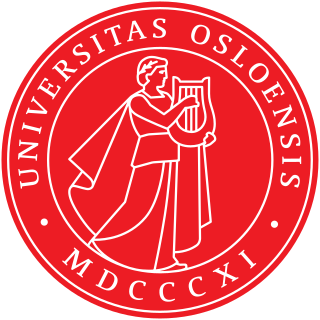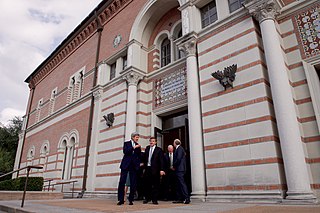Related Research Articles

Social science is one of the branches of science, devoted to the study of societies and the relationships among individuals within those societies. The term was formerly used to refer to the field of sociology, the original "science of society", established in the 18th century. In addition to sociology, it now encompasses a wide array of academic disciplines, including anthropology, archaeology, economics, human geography, linguistics, management science, communication science, psychology and political science.

The University of Oslo is a public research university located in Oslo, Norway. It is the oldest university in Norway. Originally named the Royal Frederick University, the university was established in 1811 as the de facto Norwegian continuation of Denmark-Norway's common university, the University of Copenhagen, with which it shares many traditions. It was named for King Frederick VI of Denmark and Norway, and received its current name in 1939. The university was commonly nicknamed "The Royal Frederick's" before the name change, and informally also referred to simply as Universitetet.

Humanities are academic disciplines that study aspects of human society and culture, including the fundamental questions asked by humans. During the Renaissance, the term 'humanities' referred to the study of classical literature and language, as opposed to the study of religion or 'divinity.' The study of the humanities was a key part of the secular curriculum in universities at the time. Today, the humanities are more frequently defined as any fields of study outside of natural sciences, social sciences, formal sciences, and applied sciences. They use methods that are primarily critical, speculative, or interpretative and have a significant historical element—as distinguished from the mainly empirical approaches of science.

The following outline is provided as an overview of and topical guide to academic disciplines:
The Graduate School and University Center of the City University of New York is a public research institution and postgraduate university in New York City. Serving as the principal doctorate-granting institution of the City University of New York (CUNY) system, The CUNY Graduate Center is classified among "R1: Doctoral Universities – Very High Research Activity". The school is situated in the landmark B. Altman and Company Building at 365 Fifth Avenue in Midtown Manhattan, opposite the Empire State Building. The CUNY Graduate Center has 4,600 students, 31 doctoral programs, 14 master's programs, and 30 research centers and institutes. A core faculty of approximately 140 is supplemented by over 1,800 additional faculty members from CUNY's eleven senior colleges and New York City's cultural and scientific institutions.

"Rice University's Baker Institute for Public Policy", also known as the "Baker Institute", is an American think tank housed on the campus of Rice University in Houston, Texas. Founded in 1993, it functions as a center for public policy research. It is named for James A. Baker, III, former United States Secretary of State, Secretary of the Treasury, and White House Chief of Staff. It is directed by Ambassador David M. Satterfield and funded mainly by donor contributions, endowments, and research grants.

The environmental humanities is an interdisciplinary area of research, drawing on the many environmental sub-disciplines that have emerged in the humanities over the past several decades, in particular environmental literature, environmental philosophy, environmental history, science and technology studies, environmental anthropology, and environmental communication. Environmental humanities employs humanistic questions about meaning, culture, values, ethics, and responsibilities to address pressing environmental problems. The environmental humanities aim to help bridge traditional divides between the sciences and the humanities, as well as between Western, Eastern, and Indigenous ways of relating to the natural world and the place of humans within it. The field also resists the traditional divide between "nature" and "culture," showing how many "environmental" issues have always been entangled in human questions of justice, labor, and politics. Environmental humanities is also a way of synthesizing methods from different fields to create new ways of thinking through environmental problems.

Digital humanities (DH) is an area of scholarly activity at the intersection of computing or digital technologies and the disciplines of the humanities. It includes the systematic use of digital resources in the humanities, as well as the analysis of their application. DH can be defined as new ways of doing scholarship that involve collaborative, transdisciplinary, and computationally engaged research, teaching, and publishing. It brings digital tools and methods to the study of the humanities with the recognition that the printed word is no longer the main medium for knowledge production and distribution.
Darwinian literary studies is a branch of literary criticism that studies literature in the context of evolution by means of natural selection, including gene-culture coevolution. It represents an emerging trend of neo-Darwinian thought in intellectual disciplines beyond those traditionally considered as evolutionary biology: evolutionary psychology, evolutionary anthropology, behavioral ecology, evolutionary developmental psychology, cognitive psychology, affective neuroscience, behavioural genetics, evolutionary epistemology, and other such disciplines.

The College of Arts and Letters is the oldest and largest college within the University of Notre Dame. The Dean of the College of Arts and Letters is Sarah Mustillo.
David Theo Goldberg is a South African professor working in the United States, known for his work in critical race theory, the digital humanities, and the state of the university.
Culturology or the science of culture is a branch of the social sciences concerned with the scientific understanding, description, analysis, and prediction of cultures as a whole. While ethnology and anthropology studied different cultural practices, such studies included diverse aspects: sociological, psychological, etc., and the need was recognized for a discipline focused exclusively on cultural aspects.
The Houston Advanced Research Center, commonly referred to as HARC, is a 501(c)(3) not-for-profit organization based in The Woodlands, Texas with the aim of improving human and ecosystem well-being through the application of sustainability science and principles of sustainable development. HARC employs a staff of about 30 researchers and administrators. By 2008, $20 million in revenue is anticipated, mainly from initiatives funded by governmental bodies, foundations, and businesses.
The MIT School of Humanities, Arts, and Social Sciences (SHASS) is one of the five schools of the Massachusetts Institute of Technology, located in Cambridge, Massachusetts, US. The school includes 11 academic areas and works alongside six departments, labs, and programs. SHASS grants SB, SM, and PhD degrees. Major fields of study include anthropology, comparative media studies and writing, economics, history, linguistics, literature, music, philosophy, political science, science, technology, and society, and theater arts. Other programs include the Center for International Studies; Knight Science Journalism; Science, Technology, and Society; Security Studies; and HyperStudio.
Stanford University has many centers and institutes dedicated to the study of various specific topics. These centers and institutes may be within a department, within a school but across departments, an independent laboratory, institute or center reporting directly to the dean of research and outside any school, or semi-independent of the university itself.
The following outline is provided as an overview of and topical guide to the humanities:

Marina G. Zurkow is an American visual artist based in New York City who works with media technology, animation and video. Some of the less traditional mediums are known to be dinners, life science and bio materials. Her subject matter includes individual narratives, environmental concerns, and reflections on the relation between species, or between humans, animals, plants and the weather. Her artworks have been seen in solo exhibitions at DiverseWorks in Houston Texas and at FACT in Liverpool. Zurkow is the recipient of a Creative Capital grant and has had fellowships from the Guggenheim and the Rockefeller Foundation.
Dominic Boyer is an American-born cultural anthropologist, writer, filmmaker and podcaster whose work focuses on relationships between energy and environment, media and politics. He is the son of historian John W. Boyer.
Cymene Howe is a cultural anthropologist and Professor in the Department of Anthropology at Rice University, Houston, Texas, United States. Her research has focused on environment, inequalities and the anthropology of climate change. She has also been active in multi-modal approaches to knowledge and public anthropology through podcasting, documentary filmmaking and installations, most notably the Okjökull memorial.
References
- ↑ Falk, Jeff. "New Rice University center is first to connect human sciences, energy, environmental research". Rice University News & Media. Retrieved 2015-09-26.
- ↑ "Artist brings complex issues to the table". 28 March 2014. Retrieved 2015-09-26.
- ↑ "Hydrocarbons: They're What's For Dinner". www.artsjournal.com. Retrieved 2015-09-26.
- ↑ "Houston Area Events – January" . Retrieved 2015-09-26.
- ↑ "Jón Gnarr is moving to Houston" . Retrieved 2015-09-26.
- ↑ Falk, Jeff. "Gnarr: Climate change is not a joke". Rice University News & Media. Retrieved 2015-09-26.
- ↑ "Jón Gnarr Moving To Houston, Texas - The Reykjavik Grapevine". 14 October 2014. Retrieved 2015-09-26.
- ↑ "An Anarchist Icelander Walks Into a Texas University . . . - Texas Monthly". 14 August 2015. Retrieved 2015-09-26.
- ↑ "Comedian-turned-mayor Jon Gnarr moving to Houston". 23 October 2014. Retrieved 2015-09-26.
- ↑ Falk, Jeff. "'Cultures of Energy' brings together leading energy, environmental and humanities scholars at Rice". Rice University News & Media. Retrieved 2015-09-26.
- ↑ "New 'Cultures of Energy' podcast series explores the energy humanities". news.rice.edu. Retrieved 2016-03-02.